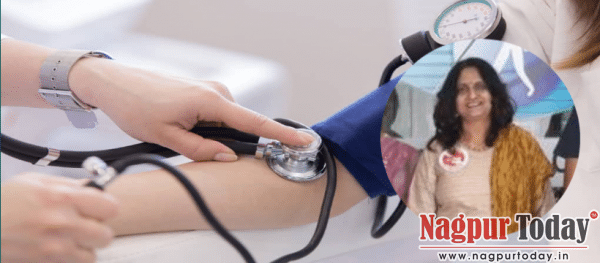
A recent study conducted by the India Hypertension Control Initiative (IHCI) reveals that uncontrolled high blood pressure or hypertension is the most common reason for sudden heart attack among patients in India. One in four adults suffer from this most common, ‘silent killer’ disease, hypertension or high blood pressure in India.
The disease which can detected at an early stage in any primary healthcare centre in India, is vastly undetected purely because of lack of awareness among both urban and rural population.
Though prevalence of hypertension is common among both men and women, the recent Lancet study revealed that India is ranked 193rd for women and 170th for men in the rate of hypertension diagnosis among 200 countries. Almost one in five women aged 15–49 years in India has undiagnosed hypertension with implications for personal and reproductive health. (India National Family Health Survey NFHS- 4 2015–2016).
Number of hypertension cases in Maharashtra also indicates the severity of the problem in the state which needs to be addressed at the earliest. The findings of the Longitudinal Ageing Study in India Wave 1 which covered 3973 individuals in as many as 2421 households, revealed that 51.8% suffers from hypertension with as much as 40 percent cases of pre-hypertension in Maharashtra alone.
In addition to the risk of CVD (cardio-vascular diseases), hypertension in pregnant women (PIH – Pregnancy Induced Hypertension) may progress to chronic hypertension in many cases. PIH is notoriously known to complicate pregnancy
and affect childbirth outcomes. Hypertensive disorders in pregnancy, which are linked to pre-existing hypertension, are among the leading causes of maternal deaths in India. Tobacco use, smoking, alcohol among childbearing age women further aggravates the health outcomes of uncontrolled hypertension.
Women unlike men suffer from various forms of hypertension which includes hypertension related to menopause, oral contraceptive use, or pregnancy. Studies have shown that hypertensive pregnancy disorders, pre-eclampsia in
particular are important risk factors in women, leading to an increased risk of heart disease, CVDs(Cardio Vascular Diseases) and hypertension.
Among other complications, hypertension can cause serious damage to the heart. Excessive pressure can harden arteries (atherosclerosis), decreasing the flow of blood and oxygen to the heart. Hypertension can also burst or block arteries that supply blood and oxygen to the brain, causing a stroke.
Though some of the symptoms of identifying high blood pressure is common between both men and women, there are some specific symptoms which a woman can look out for before it gives rise to severe complications. Some women who
take birth control pills may notice a slight elevation in blood pressure. Women who are overweight or have a family history of hypertension, can also have increased chances of high BP. This is the reason, a thorough checkup is essential before prescribing Oral Contraceptives. Preeclampsia which is common among many pregnant women is usually
characterized by high blood pressure. Though it is a manageable condition, yet women who have a history of hypertension are affected and needs to be treated very early. Prevention of PIH is the essence of obstetrics.
Around Menopausal age, triad of Hypertension, Diabetes and Abnormal Uterine Bleeding is seen associated with Uterine Cancer. Long standing Hypertension affects vision too due to Hypertensive Retinopathy and Retinal Hemorrhage.
The guidelines adopted for management of hypertension is common in both men and women which includes weight control, decreased intake of salt and increased consumption of fresh fruits and vegetables. But the most important thing is to measure your blood pressure regularly and visit the primary health care centre, the moment you see fluctuations in your BP or a sudden rise in blood pressure.
As the world is continuing its fight with Covid-19, importance of keeping our heart healthy has increased more than ever. World Heart Day this year is only a reminder to use the digital power to manage and improve awareness of cardio-vascular diseases. This year the theme of heart day is USE HEART TO CONNECT is about using your knowledge, compassion and influence to make sure you, your loved ones and the communities you’re part of have the best chance to live heart- healthy lives. It’s about connecting with our own hearts, and using the power of digital to connect every heart, everywhere. Regular checkups or using various digital apps to monitor your BP are recommended.
Authored by
Dr.Sunita Mahatme
M.D. (Obstetrics & Gynecology)
Director, Mahatme Health & Happiness Hospital, Mumbai














